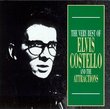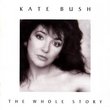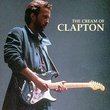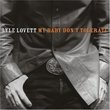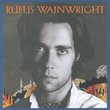| All Artists: Tom Waits Title: The Black Rider (1993 Studio Cast) Members Wishing: 4 Total Copies: 0 Label: Island Original Release Date: 11/2/1993 Release Date: 11/2/1993 Album Type: Cast Recording Genres: Alternative Rock, Folk, Special Interest, Pop, Rock Styles: Poetry, Spoken Word & Interviews, Singer-Songwriters, Progressive, Progressive Rock Number of Discs: 1 SwapaCD Credits: 1 UPCs: 731451855924, 731451855948 |
Search - Tom Waits :: The Black Rider (1993 Studio Cast)
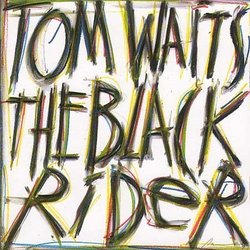 | Tom Waits The Black Rider (1993 Studio Cast) Genres: Alternative Rock, Folk, Special Interest, Pop, Rock
Summoned to Hamburg, Germany, to write music for a live stage production of Robert Wilson's The Black Rider, musical mastermind Waits took to the task at hand with gusto, assembling an eclectic crew of musicians to become ... more » |
Larger Image |
CD DetailsSynopsis
Amazon.com Summoned to Hamburg, Germany, to write music for a live stage production of Robert Wilson's The Black Rider, musical mastermind Waits took to the task at hand with gusto, assembling an eclectic crew of musicians to become "the pit band [he'd] always dreamed of." Several years later Waits assembled another "orchestra" in San Francisco to record many of the songs he'd written for the live production. Those tracks are found here, alongside a few rough gems from sessions in Hamburg. You'll find some musical matter familiar to Waits fans: accordions, carnivals, violas, banjos, the devil (a key figure in The Black Rider), a singing saw, bassoons, and trombones. Waits's many voices tell the rather disjointed story with a variety of musical styling, and the assembled whole is pretty much a sum of its parts (but at least they're interesting parts): a touch of Day of the Dead, a whiff of carny, a nod to Brecht, a dash of film noir, and the scent of narcosis (William Burroughs makes an appearance here). Not easy listening, by any means, but a feast for the ears. --Lorry Fleming Similarly Requested CDs
|
CD ReviewsWaits's best work M. E Mattson | Uva Ursi | 10/15/1999 (5 out of 5 stars) "The song "November" is a kind of microcosm for this album, which evokes skeletal trees, looming clouds, piles of dead leaves, and harrowing winds. A post-halloween, pre-dead of winter atmosphere pervades this record. While Tom Waits is a great original talent, with piles and piles of brilliant songs, he tends to "show his hand" too much, so that his act is revealed as just that--an act. And since most of his material depends on you buying into his persona(e), sometimes you come away unconvinced.Not here; and ironically, this is music for a stage production. But I don't think I've ever heard Waits quite this confident in his powers and so at home with his considerable gifts for settings, lyrics, and performance. In the instrumental "Russian Theme," when he "counts off," you can see him flailing his arms at the musicians to keep the music going. The recurrent themes of impending death are perfectly complimented by gleeful black humor; lyrically and sonically, The Black Rider holds together perfectly as a unified work." Achingly Beautiful C. Helton | 09/30/2002 (5 out of 5 stars) "I was always of the opinion that Tom's years at Island Records were his most ingenius (though this year's double release of "Alice" and "Blood Money" quite possibly changed all that), and I have always disagreed with the folks (well-intentioned though they may be) that say "Bone Machine" was the last "true" Tom Waits album before the release of "Mule Variations." I personally see Tom all over this album. Granted, I did not have the privelege of actually seeing a stage production of "The Black Rider," and the only things I know about the plot I got from the liner notes. Still, I think something in this play must have touched Tom's soul in a profound way. To chart this album on the Waits map, I'd put it about halfway between his wild and ambitious late-80s project "Franks Wild Years" and his just-released tearfully touching opus "Alice." It is, of course, no coincidence that those two albums were also the results of theatric endeavours. Still, "The Black Rider" is unique in that the story itself was not a product of Waits's imagination, yet he seems to relate to it almost as if it were. "November," "That's the Way," and "Briar and the Rose" lend touches of real beauty to this album. "Briar and the Rose" especially would not seem out of place on "Alice," while "Just the Right Bullets" and "Crossroads" seem to let you in on what Tom really thinks about the whole mess. The instrumentals on this are cacophonous even for Waits, which may or may not turn you on, depending on taste. Of course, no Waits album would be complete without the glitz of the carnival scene making an appearance in some form. We get this on the opening track, with Tom giving his own rendition of barker patter. (Real Waits listeners will no doubt notice within this opening track an incarnation of the freak who makes an appearance on "Alice" as none other than Tabletop Joe.) All in all, most people will say this album is not for introductory listeners. I say that depends on what you're looking for in Tom Waits. If you're looking for his genius in all its freakishly beautiful glory, you'll find few purer concentrations than right here." I saw Black Rider and . . . Reba | San Francisco, CA | 10/13/2004 (5 out of 5 stars) "it makes this album amazing and make sense. The show has only played in the US once (this past fall in San Francisco)-- so it is hard to see, but if you ever get the chance you should. It is really an amazing collaboration of three brilliant artists. Like any musical cast recording, the record is hard to understand the full story or make perfect sense of why the songs sound the way they do when you can't see the visual or hear the rest of the text. Because I did, I love the album. I can understand why you might not get into it if you haven't seen it, but I think approaching it like you would a sountrack to a musical is helpful.
And just an FYI -- it's the story of Faust told in a crazy freak show kind of world. The hunting and the bullets comes in because the devil can give you 12 magic bullets that will always hit their target if you sell your soul. Plus it ties in in a creepy way to heroine and Burrough's (who wrote the text) shooting his wife." |

 Track Listings (20) - Disc #1
Track Listings (20) - Disc #1